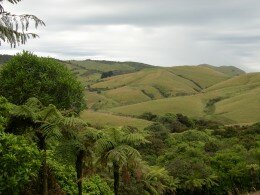Environmental Management
 Key Topics
Key Topics
- Optimal governance for enhancing environmental and social outcomes
- Ecosystem health and restoration
- Social-ecological resilience
- Contribution of traditional and local knowledge together with discipline-based knowledge
Principal Investigators
- Dr. Janet Stephenson
- Professor Henrik Moller
- Dr. Cilla Wehi
- Corey Bragg
- Dr. Chris Jacobson
Current Funded Research
- Whakatauki & Conservation
- Tirohia he Huarahi: Plans, Power, Partnerships
- Te Tiaki Mahinga Kai: Application of traditional knowledge and social-ecological research to enhance environmental and cultural wellbeing through m?taitai and tai?pure
- Computer decision support to aid sustainable customary use of taonga species
- Knowledge use in co-management
___________________________________________________________________________
History
CSAFE?s involvement in environmental management began with Professor Henrik Moller?s long-running research collaboration with Rakiura M?ori, Kia Mau Te T?t? Mo Ake T?nu Atu or Keep the T?t? Forever (1996-2007, MSI-funded project). In Climate Change Impacts (2005-2008, MSI-funded project), CSAFE teamed with the National Institute for Water & Atmospheric Research (NIWA) to examine a link between birder harvest success and the upcoming Southern Oscillation Index. A further related project looked at marine ecology perturbations, climate change, and the sustainability of the t?t? harvest (2010, UORG-funded project). Te Honong? o ng? Ao (2007-2008, MSI-funded project) sought to maximise uptake of the research results and support the Rakiura M?ori community to decide how it can best respond to climate change impacts and increasing numbers of people with birding rights.
Relationships developed from the t?t? project, and other consultation and networking led to the design of a new umbrella research programme, Te Tiaki Mahinga Kai, and its subsequent funding (2007-2011, MSI-funded project). A related project built research capacity among emerging M?ori researchers, who undertook research for communities that aligned with their own identified research agendas (2008, BRCSS-funded project). An additional project identified barriers and solutions to conducting research from a ?flax roots? level in local customary fisheries (2008-2009, funded by Ng? Pae o Te M?ramatanga). A post-doctoral project, Ka ora te whenua, ka ora te tangata, explored the role that whenua and moana play in the lives and wellbeing of tangata whenua (2007-2010, MSI-funded project).
Further collaborative research projects have been undertaken specifically within the Ng?i Tahu rohe. A major project has been the development of a Marine Cultural Health Index as a local monitoring tool, using the traditional knowledge of Ng?i Tahu kaitiaki (2007-2010, funded by Te Ruanga o Ng?i Tahu). Smaller projects have looked specifically at damage to toheroa from vehicle use on beaches, and restoration methods for toheroa and p?ua, utilising traditional knowledge (MFish/?raka Aparima R?naka, MFish/?nuku & Wairewa R?nanga). Two fishing surveys have been undertaken for Ng?i Tahu, one looking at fishing effort and success on Akaroa tai?pure and Te Whaka a Te Wera m?taitai management areas (2007-2009, funded by Canterbury University), and the other on East Otago tai?pure and Puna Wai T?riki M?taitai management areas (2009-2010, funded by Ng?i Tahu).
Some of the research in this stream involves iwi from elsewhere in Aotearoa. M?ori Knowledge and the RMA (2008-2011, MSI-funded project) set out to develop a ?toolbox? to enhance inclusion of M?ori concerns and values into the resource consent process. Te Hiringa Tangata Ki Te Tai Timu Ki Te Tai Pari (2009-2013, MSI-funded project) focuses on restoration approaches to North Island coastal forest ecosystems where their seabird populations have been devastated.
Tirohia he Huarahi: Plans Power Partnerships (2009-2012, Marsden-funded project), a research collaboration with Canadian colleagues, takes a high-level overview of the complex legal and political situation with indigenous management of land and marine resources. Knowledge Use in Co-Management (2011-2014, funded by Marsden Fast Start) examines the use of indigenous knowledge in co-management arrangements in New Zealand and Australia.
One offshoot of the Kia Mau Te T?t? Mo Ake T?nu Atu research project also concerns climate change, specifically its effects on El Niño and La Niña fluctuations. This project (Climate Change Impacts on M?ori) has huge impacts on the sustainability of t?t? harvesting and thereby on Rakiura M?ori culture, but also on wider implications for agriculture, fishing, public health and environment for all countries around the Pacific Rim.